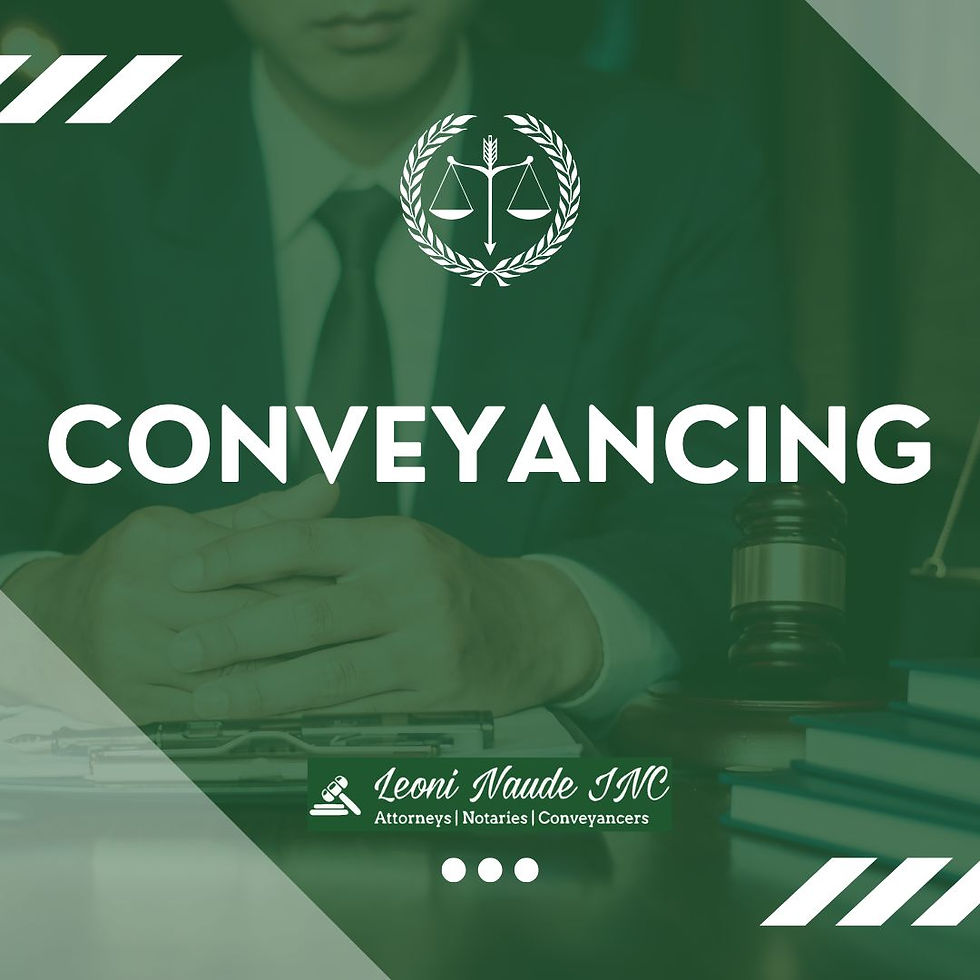Understanding Conveyancing in South African Law: A Guide for Buyers and Sellers
- Admin

- Nov 11, 2024
- 3 min read

Conveyancing is a crucial part of property transactions, ensuring the legal transfer of ownership from seller to buyer. In South Africa, this process is highly regulated, requiring expertise and precision. Here’s what you need to know about conveyancing and how it safeguards your property transactions.
What is Conveyancing?
Conveyancing is the legal process of transferring property ownership. In South Africa, only qualified attorneys registered with the South African Law Society are permitted to act as conveyancers. Their role involves preparing and verifying legal documents, managing funds involved in the sale, and ensuring the property’s title deeds are correctly registered.
The Role of a Conveyancer
A conveyancer’s primary duty is to ensure that every part of the transaction complies with South African law. They work closely with banks, local municipalities, and the Deeds Office to ensure that:
All rates and taxes are paid up to date.
No claims are held against the property.
Financing is in place if needed.
Ownership is legally transferred and registered.
Each transaction includes multiple parties, including the buyer, seller, estate agents, and financial institutions, all coordinated by the conveyancer.
Steps in the Conveyancing Process
The conveyancing process in South Africa is complex, typically involving the following steps:
Sale AgreementThe conveyancing process begins when the buyer and seller sign the offer to purchase. This legally binding document outlines the terms and conditions of the sale, including the purchase price, deposit, and transfer date.
Bond Application and ApprovalIf the buyer requires a bond (mortgage), they must apply for it. Once approved, the bank appoints a bond attorney to register the bond, working alongside the conveyancer to ensure financing aligns with the property’s registration.
Transfer of PropertyThe conveyancer prepares and submits the transfer documents to the Deeds Office. They ensure all rates, taxes, and levies are cleared, facilitating a smooth transfer.
Final RegistrationOnce the Deeds Office approves, the new title deed is issued in the buyer's name, marking the formal transfer of ownership. This step can take several weeks, depending on the Deeds Office’s efficiency.
Legal Costs in Conveyancing
Both buyers and sellers should be aware of the costs involved:
Transfer Duty: Payable by the buyer, based on the property’s purchase price. Properties under R1 million are exempt.
Transfer Fees: Cover the conveyancer’s services, typically calculated on a sliding scale based on the property value.
Bond Registration Fees: If the buyer takes out a mortgage, these are paid to the bond attorney handling the bond registration.
Protecting Your Interests
In a property transaction, it’s essential to:
Choose a reputable conveyancer with experience in the local property market.
Review all documents carefully before signing.
Ensure that funds are only transferred through secure, attorney-trust accounts.
A skilled conveyancer will navigate any challenges, ensuring the process is smooth and compliant.
Common Issues in Conveyancing
Delays can occur due to:
Incomplete documentation.
Outstanding municipal rates and taxes.
Mortgage approvals that take longer than expected. Working with an experienced conveyancer reduces the likelihood of these issues and ensures prompt resolution if they arise.
Final Thoughts
Conveyancing is a vital legal step that protects both buyers and sellers. Engaging a knowledgeable conveyancer not only streamlines the process but also safeguards your investment. Understanding each step and potential costs will empower you to make informed decisions in your property transaction.

























Comments